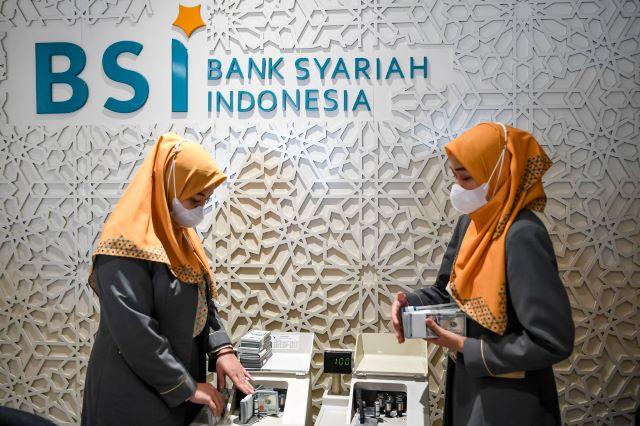Popular Reads
Top Results
Can't find what you're looking for?
View all search resultsPopular Reads
Top Results
Can't find what you're looking for?
View all search resultsFintech: Understanding risks and challenges
Change text size
Gift Premium Articles
to Anyone
T
echnological advancement has made its way into almost every aspect of human life, including financial services. During the last couple of years, we have seen an astonishingly swift emergence of start-up firms.
These companies, popularly called FinTech start-ups, have grown thanks to the ubiquity of technology in financial services.
Consequently, we have become more accustomed with the likes of PayPal, iZettle and Ripple for day-to-day financial services followed by the birth of domestic providers such as Kudo, Jojonomic and Flip.
According to online stastics portal Statista, the leading country in FinTech in terms of nominal market transactions and investment globally is the US, which booked an estimated US$769.3 billion in nominal transactions in 2016.
This is a huge amount of money compared to those in emerging countries. Indonesia, for instance, recorded estimated transactions of only $14. 5 billion.
However, there is a lot of potential to boost the size of Indonesian FinTech. Indonesia is considered to be a very promising market given the size of its population and its demographic make-up, with large generations Y and Z, who are considered to be more technology savvy.
Aware of this great potential, the Indonesian government has been paying a lot of attention to this new wave in the financial sector.
President Joko “Jokowi” Widodo’s opening of the inaugural Indonesia FinTech Festival and Conference 2016 in August shows the government’s intention to develop the sector further.
From the banking perspective, this development comes with several consequences. On the one hand, the emergence of FinTech has provided borrowers, especially the unbanked population, with an alternative way to access financial services, which could spur consumption and ultimately economic growth. On the other hand, we must be wary of the potential risks.
These risks include counterparty credit, market and operational risks.
The first involves the default of one counterparty in a peer-to-peer lending transaction facilitated by FinTech firms. The market risk relates to the probability of losing a portion of investment made by FinTech due to market movement.
Lastly, operational risk covers a wider array of risk events such as disruption to the information technology system, malware infection, and possible fraud by the firms’ employees. The list is possibly longer, including risk in settlement activities and data protection.
Additionally, when FinTech market capitalization reaches a certain level, which might impact the stability of the financial system as a whole, there is also a possible systemic risk.
To assess current developments, KPMG (2016) released a list of the top 100 FinTech companies worldwide ranked based on innovation level. There are two Chinese firms (Zhong An and Qufengi) among the top five ahead of many European and US based FinTech firms.
The Chinese success is arguably supported by strong networks and great market capitalization. With no less than 1.3 billion mobile subscribers, GDP of $11,000 billion, China is a huge market for FinTech.
Therefore, going forward, there are two inter-related aspects of FinTech that require thorough monitoring: the financial aspect and the technological aspect.
The first aspect concerns regulatory measures in the financial sector to avoid the aforementioned risks of FinTech development.
Currently, there are two main agencies involved in regulating this industry in Indonesia. Bank Indonesia regulates the payment system and macro prudential policies. The Financial Services Authority (OJK) carries out almost similar tasks to regulate banking and non-banking financial institutions.
The second aspect concerns technology and the ICT domain as the main vein of the growth of the industry. The fact that the majority of FinTech revenue still depends on transactions made through mobile networks means there is some unfinished business in regulating the mobile industry.
The regulation should aim to achieve more sustainable telecommunications industries capable of supporting the emergence of FinTech. Ideally, they are supposed to reach out to subscribers not only those concentrated in the bigger cities but more importantly the unbanked population.
Moreover, the service should be available with affordable access and usage costs.
Additionally, in the longer run, innovation in the FinTech industry also requires more efforts from government agencies and established financial institutions to co-create active research and development (R&D) by linking FinTech and start-ups.
Hence, lucrative growth can be observed not only in the financial sector but also in the supporting ICT industries in the FinTech ecosystem, including but not limited to artificial intelligence, blockchains, security, cloud, biometrics and data center.
To summarize, given the numerous authorities involved in regulating FinTech firms in Indonesia, a stronger bond of coordination between agencies is an important key to promoting the stable growth of FinTech while minimizing the risk level.
In addition, a well-regulated FinTech industry has greater possibilities to create spillover impacts, not only for the financial sector but also for the rest of economy.
It will build stronger credibility in the market denoted by the increasing demand from consumer and other industries and especially by the backward and forward linkages made by ICT industries as the main supporters.
___________________________________
Ibrahim Kholilul Rohman is an ICT industry analyst and Ariadi Diannegara is an analyst at Bank Indonesia. The views expressed are their own.










